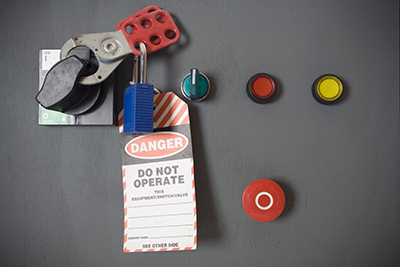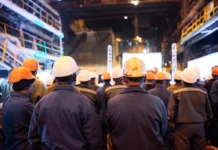by Joseph Gross and Alan Rothenbuecher,
Benesch, Friedlander, Coplan & Aronoff LLP
Although no one wants to trade off safety for productivity, plastics manufacturers cannot help but consider the implications. Although exceptions certainly exist, procedures focused on safety generally cause productivity concerns, at least in the short term. For instance, lockout/tagout (LOTO) procedures undeniably decrease productivity. Although LOTO procedures protect employees working on machinery, implementing them, monitoring them and training on them takes time away from production. Although plastics manufacturers need to audit their LOTO procedures at least annually to ensure they are effective, they also should look from time to time at how they can minimize their impact on productivity without jeopardizing safety.
The Occupational Safety and Health Administration’s LOTO standard addresses the procedures necessary to prevent hazardous energy release from machinery and other equipment while employees service, maintain and clean them. Although LOTO procedures typically require employees to shut down and de-energize the machinery they are servicing, maintaining or cleaning, the standard has an exception: alternative safety measures.
Alternative safety measures can be used for minor tool changes and adjustments that take place during normal production. These activities are not covered by the LOTO standard if they are routine, repetitive and integral to using the machinery or other equipment for production. To apply the alternative safety measures exception, consider the following:
- Determine what constitutes a minor servicing, maintenance or cleaning activity. Sometimes the answer is obvious, like when extensive disassembly of a machine would be required or mold changes. Other times, it is not as clear. Minor activities can include clearing jams or adjusting products in machines, if doing so does not put the operator in any added danger.
- If an activity is for minor servicing, maintenance or cleaning, then consider whether the activity is routine, repetitive and integral. A routine activity is part of a regular and prescribed course of procedure. A repetitive activity must be repeated regularly as part of the production process. An integral activity is inherent and necessary to the production process. In other words, these are activities necessary to keep production moving. If the activity is minor and meets the routine, repetitive and integral definitions, then LOTO is not required, and alternative safety measures can be used.
- Determine whether the alternative safety measure enables the employee to safely perform the minor servicing, maintenance or cleaning activity without being exposed to an unexpected energization or activation of the machinery or equipment, or the release of stored energy. In short, an alternative safety measure must be as safe as the LOTO procedures. An example of an alternative safety measure is an interlocked gate. An interlocked gate may temporarily disconnect the equipment from the power source. This is not an effective LOTO for a major maintenance activity or a mold change, but for a short or minor activity, it provides nearly identical protection.
- Ensure that all alternative safety measures are displayed in plain sight so all workers who are directed to perform minor servicing, maintenance or cleaning activities on the equipment can easily find them. On the equipment usually works. Graphic images showing the process have proven to be more effective than basic written instructions.
- Train employees when and when not to use alternative safety measures, and document that training with signatures and dates. Alternative safety measures, such as interlocked gates or light curtains, are not necessarily inexpensive or easy to install, especially on older equipment. Nevertheless, an OSHA citation can get into six figures now, and the cost of an injury cannot be expressed in dollars. Be safe!
Joseph Gross and Alan Rothenbuecher are partners with the law firm of Benesch, Friedlander, Coplan & Aronoff LLP. Gross concentrates his practice in a variety of labor and employment law areas, including occupational safety and workers compensation defense. Rothenbuecher concentrates his practice in the plastics industry and proactively addressing challenges faced by industry companies. The two can be reached at jgross@beneschlaw.com and har@beneschlaw.com.





